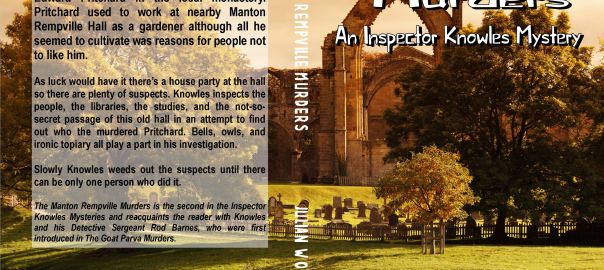This is my second homage to the detective story. I’ve always loved mystery stories by Agatha Christie, Ngaio Marsh, and Dorothy L Sayers. I watched many DVDs of detective series from the UK and this was the spark to start the creative process. I have tried to add some humour into the book. The Manton Rempville Murders is the second in the Inspector Knowles Mysteries and reacquaints the reader with Knowles and his Detective Sergeant Rod Barnes, who were first introduced in The Goat Parva Murders.
==========
Knowles and Barnes drove back to Scoresby station and immediately headed to the forensics laboratory, hoping that Dr Crabtree would have some news for them.
“Well, Colin, I don’t have that much to tell you, really. You know some of it already. Stabbed in the back with some force by someone slightly taller than the 5ft 7 inch victim – the blade has followed a slightly downward trajectory – victim died instantly and fell in a heap on the ground causing the blade to buckle and bend slightly, so that the murderer was unable to remove the sword cleanly although they had a good go, causing the exit wound to be very messy indeed. There are no fingerprints on the sword whatsoever – it was cleaned before use with a metal polish and quite possibly sharpened too.”
“Really? That sounds pre-meditated to me,” said Knowles, “go on Dr Crabtree.”
“We found a red thread on the hilt of the sword, which looks as though it has come from a sheet or towel used to hide the sword from view.”
“No great surprise there,” said Barnes, “few people could carry a sword without alerting suspicion of some kind.”
“Whereas carrying a large red towel is perfectly normal and wouldn’t be in any way uncommon,” replied Knowles, “although it was probably carried in a bag for the most effective disguise. What material is the thread?”
“I think it’s cotton, Colin, we can have it analysed for you.”
“Yes, please Doctor, I like to be thorough in the affairs of evidence.”
“Of course, Colin, that won’t be a problem.”
“And now the all important question – what was the time of death approximately?”
“Well, I am almost certain the time was 11:06pm.”
“Give or take an hour or so?” said Barnes.
“Give or take 30 seconds,” said Knowles, “the doctor is indicating that the victim must have smashed his watch when he fell dead to the ground – are there any fingerprints on the watch?”
“We’ll have to check, Colin, and let you know when it’s been dusted.”
“Thank you – I wonder whether he would have smashed his watch though, if he fell on to the grass.”
“The watch face was broken by something, Colin” said Dr Crabtree showing Knowles the watch, enclosed in a plastic evidence bag.
“Indeed it was, but there’s no indication it hit the grass, no soil, no colouring of green. Were there any stones lying around where he landed?”
“Let’s look at the photos, shall we?”
The men walked over to the doctor’s table and examined the photos that showed the ground around Morgan’s left hand.
“There’s no stones around where his left hand and wrist would have landed, so what could he have hit the watch on?” pondered Barnes.
“There’s nothing obvious is there, so either the killer did it to fool us or it was broken before he was killed,” replied Knowles, “so Doctor, what do the other signs tell us about his time of death?”
“They more or less fit with the watch, I would have put the time at between 10:30 and 11:30pm last night.”
“Interesting, so I wonder why half-an-hour could make so much difference, if the murderer knew the body wouldn’t be found until the morning?”
“It has to be to establish an alibi, sir – I can prove I was within Person X at 11:06pm and they will verify that, whereas half-an-hour earlier or later and that alibi would not hold.”
“Indeed, Sergeant, we shall have to ask our questions very carefully when we meet our suspects.”
“You have some suspects already, Colin? That was quick work.”
“Well, I suppose I shouldn’t call them suspects yet, as I haven’t even met them, but I was referring to the people who live at the hall in Manton Rempville. Adelaide Hills saw some people behaving suspiciously when she was discovering the body and they must have all come from the hall.”
“Try not to bring class politics into the conversation, Colin, especially when there’s a case to be solved.”
“Right, wait until afterwards, you mean?”
Bio: I am a writer. I love writing mysteries and thrillers, especially on topics close to my heart. A list of my books, both about travel and other subjects, can be found here.
